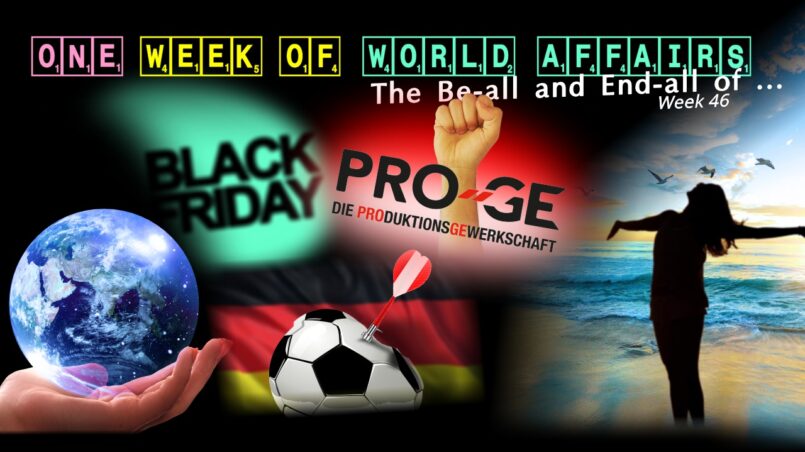The Be-All and End-All of Black Days

A commentary on the week in review – week 46/23
Who hasn’t heard of black days? As we all know, it refers to a day on which something significant goes wrong or pretty much everything somehow gets out of hand. The origin of the phrase can be traced back to “dies ater” (Latin for black, lacklustre day). Such a day was proclaimed when the Roman army suffered heavy defeats and official business was suspended. In our western world, the colour black stands for mourning, evil or a threat. World history has known several of these “black days”, most notably “Black Friday” in October 1929 when the New York Stock Exchange crashed. In America, however, it went down in history as “Black Thursday”, but in Europe it was already Friday at that time.
In contrast to these negative associations are the Black Friday events that retailers in Europe have been regularly organising at the end of November for several years now. It is currently even extended to a whole week. According to my research, the term originated in the USA: it refers to the Friday after Thanksgiving, when the Christmas shopping season traditionally begins. It is said that police officers first used the term for this day in 1966 because of massive traffic jams and overcrowded pavements. However, there are also other associations, such as the possibility of retailers being in the black or a large black mass storming the streets.
But what am I getting at?
First of all, he actually refers to the advertising-imposingly inflated announced consumer frenzy, which apparently doesn’t seem to be worthwhile this year, at least in Austria. “Of course, such campaign days stimulate purchases. But at what price?”, Christoph Teller, Director of the Institute for Trade, Sales and Marketing at the JKU Linz, is quoted as saying in the Oberösterreichische Nachrichten newspaper on 20 November 2013. The price seems to be higher this year than in previous years, and many retailers have little to no room for discounts, as the consequences of the government measures due to the pandemic are still being felt. Equity has been eroded and cost pressure has increased due to higher energy prices, rents and staff costs. In addition, the next round of collective bargaining agreements is currently underway, which – as the employees see it – must be “proper” this time. But where to get it from?
In fact, this situation shows that our economic system obviously has a dangerous catch. In the long run, it cannot even be ruled out that Black Days, which are intended to stimulate consumption, will once again become Black Fridays for the economy.
And then there are also events that could also be described as truly dark days:
The wage negotiations already mentioned for the retail sector also affect the metalworking industry. Employee representatives and employer representatives have not been able to reach an agreement here for weeks; their ideas are still miles apart. The big question is how inflation, which has soared to horrendous heights, can be taken into account in a way that is acceptable to both sides. This project is like squaring the circle and so the union has unpacked its strong arm and announced a strike up to and including 30 November. Those were the days when the much-praised Austrian social partnership elegantly avoided even such pitfalls and, ultimately, all parties involved were quite happy with this Austrian solution. But those days are long gone, as evidenced by the atypical merging of the Ministries of Labour and Economic Affairs several legislative periods ago.
There will be less daily politics and social criticism at the “Jedermann” theatre play in Salzburg from next summer. The entire ensemble, including the director, was recently replaced by a new team despite a promise to the contrary. In acting terms, nothing can be said against the multi-talented and Iffland Ring winner (following Josef Meinrad and Bruno Ganz) Phillip Hochmair, who will take on the leading role. However, the approach that brought him this role is worthy of criticism. It won’t change anything – but it will cast a shadow over next year’s performance.
Russia and Ukraine are still locked in an armed conflict that began in February last year. Although there are increasing signs that both sides, including the USA, NATO and the EU, are becoming war-weary, the question is whether this will lead to concrete peace negotiations. An article in the Guardian sparked a small, fine discussion in our editorial office, excerpts of which are reproduced here:
This coincides with rumours that the war may soon end. It says at the beginning and: “I hope that’s true.”
“It depends on the USA and NATO. But it would be devastating for Ukraine to lose its industrial areas in the east. And of course it is a fatal signal that war is worthwhile again and that a regional power like Russia can basically grab what it wants…
Militarily, the war is a stalemate and it will stay that way.”
“The war was not worth it for Russia, even if they get the eastern territories, it will certainly take Russia 10 years to compensate for the disadvantages of the war for their own economy and population. If you analyse this neutrally, then the war in this form is not an invitation to war. At best, it will be a Pyrrhic victory. Russia’s future is to be China’s bedside rug. Now they are definitely a regional power.”
“Are you sooo sure about that? Ukraine’s heavy industry is now in Russian hands… And Putin always didn’t care about his own people… Is it possible to determine in real terms what the disadvantages of the war were/are for Russia?”
“The entire economy is geared towards war, economic growth is completely for the fish, because it all goes into weapons. The sanctions are also causing damage – not as much as we are often led to believe, but it can’t pass Russia by without causing damage. The part of Ukraine that Russia gets is destroyed. Billions and billions have to flow in until a profit comes out of it. Yes, maybe a few rich noses will make billions from the reconstruction, just like after the fall of the Berlin Wall. But for Russia as a whole, I don’t see how this can become a successful model in the foreseeable future.”
One thing is certain: as long as this war continues, there will be one black day after another for everyone who is directly or indirectly affected by it.
Finland is also going one better, thereby completely destroying its ties with Russia. Accused of supporting illegal border crossings by asylum seekers, Russia is about to close its border with its eastern neighbour completely. So gone are the days when relations were cultivated over vodka and bear hunting despite all the differences.
It remains to be seen to what extent Argentina actually voted for the promised rosy future last weekend. Here too, one or two Black Days could follow if election programmes are to be cast in realpolitik. The victorious candidate, Javier Milie, who describes himself as an anarcho-capitalist, hardly wants to leave one stone unturned: on the contrary, he is planning to abolish the state. It remains to be seen what role he will play in a state that no longer exists. But perhaps he sees himself in the tradition of the French kings according to the motto “L’état, c’est moi!” Including a rude awakening for all his voters.
The Austrian state broadcaster recently announced that the EU has now given the green light for the Austrian federal government’s “quality journalism subsidy”, which will primarily benefit Austria’s largest media house. How this fits in with a report in ZIB III on November 21st, in which it was reported which conspiracy myths the former corona deniers now subscribed to (note the double framing). The Federal Centre for Sectarian Affairs is now investigating this development. Which brings us to the third framing in just two sentences. This is what quality journalism worthy of support looks like. With this step, the EU is certainly giving the Austrians a lot of dark days in the media. How good that there are also serious independent media, such as Idealism Prevails.
With so much negative reporting, it’s no wonder that the citizens of our no longer quite so blissful country are stocking up on firearms. The number of registered weapons rose by 40% between 2018 and this year, from one million to 1.4 million.
Speaking of weapons: The conflict between Israel and Hamas is also showing the first signs of easing tensions: a four-day ceasefire should lead to a mutual exchange of hostages and prisoners; it should also be possible to bring aid supplies to the Gaza Strip during this time. But here too, every day that passes in this madness is a black day for the civilian population of both countries. And this action will not solve the underlying problems of the conflict. Ultimately, both sides will have to make a massive effort here, because neither terrorist attacks nor the annihilation of the opposing population are constructive ways of settling the conflict that has been going on for decades.
Shortly before completing my commentary, tape recordings suddenly emerged in which the recently deceased Christian Pilnacek accuses the ÖVP, in particular National Council President Wolfgang Sobotka, of attempting to intervene in various proceedings. Cui bono? And why now? While some reject the accusations, the Green Justice Minister has decided to set up a commission of enquiry to investigate the allegations. Black days for the blacks, perhaps.
The German national football team is also in such a situation, and not just since the 2-0 defeat against Austria in a friendly match last Tuesday. This calendar year has seen more defeats than victories, most recently in Berlin in a match against Turkey. New national team coach Julian Nagelsmann is already having to deal with increasing criticism after four games in which his team has achieved a win (3-1 against the USA), a draw (2-2 against Mexico) and the two defeats just mentioned, which he does only reluctantly and rather thin-lipped. 2023 is not his year.
Austria’s victory was thoroughly deserved, but it came against a reeling German team made up of high-quality individual players but lacking in team spirit. This will be the main thing to work on if they want to be successful at the European Championships at home next June. And our boys should not overrate their success. With the German Ralf Rangnick, who has been coaching the Austrians for around one and a half years, the necessary grounding should be guaranteed, despite numerous media reports.
The so-called quietest days of the year are coming up soon, which should also bring plenty of light. In fact, they will only be as bright as we are able to make them. Despite the events that keep piling up towards the end of the year, I have decided to switch my weekly commentary to a fortnightly rhythm until the end of the year so that my family and I can also enjoy the odd bright hour in the run-up to Christmas. I know from experience what effect Christmas stress can have on the desired Christmas peace. I would like to prevent this in this way. Perhaps you, too, will find the remedy of your choice that will enable you to approach a truly relaxed and joyful Christmas season. I wish you all the very best!
Credits
| Image | Title | Author | License |
|---|---|---|---|
 |
WG – 2023 KW46-E-YT | Wolfgang Müller | CC BY-SA 4.0 |
